US demand spurs product innovations in telescopic booms
24 April 2024
With more boom lift manufacturers supplying the market than ever before, the industry has seen an influx of new units come into the fold. Take, for example, this year’s ARA Show, where MEC, JCB and Sinoboom all showcased never-before-seen telescopic booms for the North American market.
MEC, which has taken a step back from its longtime reputation of being a manufacturer of specialist access equipment, turned heads with its new articulated and telescopic boom, the DualReach 85-J. Featuring a working height of 91 feet in telescopic mode, the boom lift offers a maximum outreach of 70 feet, and in articulated mode, a maximum up-and-over height of 21 feet, allowing easy access to challenging environments.
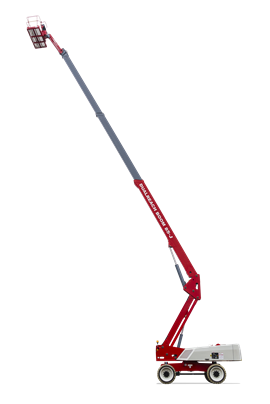 MEC debuted its DualReach 85-J recently. (Photo: MEC)
MEC debuted its DualReach 85-J recently. (Photo: MEC)
The patent-pending design allows users to choose telescopic mode for maximum outreach or articulated mode for up-and-over tasks by turning a switch while the machine is stowed.
Gary Crook, vice president of engineering at MEC, said the DualReach 85-J represents a paradigm shift in how jobsites operate.
“The two-in-one machine functionality is a game-changer, particularly in projects with different work-at-height needs, where traditionally, both a telescopic boom and an articulated boom may have to be sent to a jobsite,” he said. “The flexibility to adapt to different needs without the need for two different machines provides enhanced productivity, especially in complex environments.”
Rental equipment dealers stand to benefit with the ability to meet the request of various application uses in one machine and cutting down on logistical costs and hassles, according to MEC.
One of the key features of the 85-J is its enhanced articulation and capacity. The boom has an articulated jib capable of up to 135 degrees of movement. This, along with a 600-pound unrestricted/900 pounds restricted platform capacity at maximum outreach in both telescopic and articulated modes, is designed to provide flexibility and efficiency.
“With the MEC DualReach 85-J Boom design we were able to offer the ability to switch between the two and enable one machine to work around the construction structures that change as the project progresses,” Crook added. “There has long been this challenge of carrying both telescopic and articulated booms to meet all customer needs. [This] one machine covers the reach envelope of both types [and] ensures you always have the right tool for the job.”
For more on MEC, see our exclusive interview with President David White here.
JCB’s expanding product range
JCB used ARA to debut a new 65-foot diesel-powered telescopic boom lift, the T65D. The machine features dual-zone lift capacity, allowing it to handle 1,000 pounds in the basket through 80 percent of its range and 600 pounds through 100 percent of the range. The platform’s basket height reaches 65 feet, 4 inches, and maximum outreach tops out at 56 feet, 6 inches.
Powered by a 74-horsepower JCB 444 EcoMAX engine, the T65D offers 360-degree continuous rotation, an 8-foot basket, and three access points for operators and users.
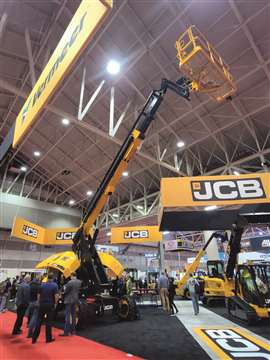 JCB’s new 65-foot diesel-powered telescopic boom lift, the T65D. (Photo: KHL)
JCB’s new 65-foot diesel-powered telescopic boom lift, the T65D. (Photo: KHL)
“With the T65D, JCB expands its presence in the MEWP sector,” said Chris Giorgianni, Vice President of Product for JCB in North America. “The company has achieved excellent results with its scissor lifts and articulated booms and aims to surpass its customer expectations with this new product line. The addition of this telescopic boom fills another key segment of the market, making JCB a comprehensive provider of solutions for our customers.”
A 5-inch display in the basket shows the total load as a percentage of capacity, as well as warning lights, fuel level and machine position. USB charging points come standard with the platform console. The controls on the base of the machine are toggle switches accompanied by a seven-inch touch screen with built-in diagnostics capabilities.
The platform control box features a dial to control the speed of the boom. This, combined with proportional joysticks for basket control, enables workers to maneuver precisely and safely close to working surfaces but also move with speed and efficiency when obstacles are out of the way, according to JCB.
The JCB 444 EcoMAX engine that drives the T65D gives it a “unique advantage in this size class,” Connor Stanmore, product manager – Access Products, JCB, said. “Most telescopic boom lifts in this size class use a 40- to 50-horsepower engine. At 74 horsepower, the T65D has enough muscle to push through muddy terrain, steep grades and difficult underfoot conditions without bogging down and slowing work.”
For crews that deploy welders in the basket, the T65D uses the Harrison Hydra-Gen PTO-based hydraulic generator. Smaller, more compact and lighter than engine-powered generators, the Harrison generator can run the welder at full power with no loss of performance from the primary diesel engine, said Stanmore.
Speaking to Access Briefing during the 2024 ARA Show, Stanmore said JCB will transition the boom lift’s production from India, where it currently is being manufactured, to the company’s forthcoming production plant in Texas. In late 2023, JCB announced it was looking at 400 acres of land near San Antonio to construct a 720,000-square-foot manufacturing facility. The new plant will be the second largest of JCB’s 22 global production facilities.
Meeting increasing needs
Sinoboom’s latest launch into the North American market is the TB860EJ Plus, which the company had on display at The ARA Show. The all-electric telescopic boom joins four additional telescopic products in the company’s current N.A. lineup.
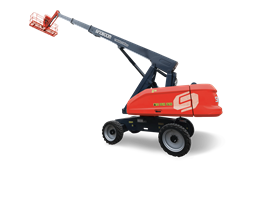 Sinoboom’s latest launch into the North American market is the TB860EJ Plus. (Photo: Sinoboom North America)
Sinoboom’s latest launch into the North American market is the TB860EJ Plus. (Photo: Sinoboom North America)
The TB860EJ Plus features a 92-foot, 10-inch working height and unrestricted capacity of 1,000 pounds. The unit also features 45 percent gradeability, 160-degree platform rotation and 360 degree/continuous turntable rotation.
“Regarding electrification, invention is the mother of all necessities,” Desmond Soh, Sinoboom N.A. CEO told ALH. “Our TB860EJ Plus looks exactly the same as the diesel version, but there’s no engine inside.”
Instead, the unit is powered by two, 40 volt, 480Ah batteries, making it meet all indoor or emissions-critical site requirements.
Additionally, the unit is equipped with a 7-inch smart screen display that delivers real-time machine status data and enables quick fault diagnosis to help minimize downtime.
“The whole machine is wired so that if anything goes wrong, the fault code immediately pops up on the screen,” Soh explained.
This technology, alongside over-the-air updates to come soon, is just one of the factors that Sinoboom says sets it apart from competition – and lowers costs for fleet owners.
“The market knows we are not the cheapest,” Soh said. “And we don’t intend to be the cheapest brand.”
Sinoboom operates and manufactures its products based on its core values of honesty and integrity, excellence in everything the company does, customer satisfaction, importance of partners, and product quality – and the company looks forward to showing customers across North America its commitment to providing top-notch aerials.
“Our values are all interconnected because if you have good design, you have good parts, you have good quality, you have good ground support, it means less downtime, as well as a lower total cost of acquisition.
“We continue to invest and continue to figure out what areas we can help fill a gap, whether it comes to a product, solution or so forth.”
So, where is market demand coming from?
The North American rental industry is poised for continued growth with a generally positive outlook, illustrated in part by a return to pre-pandemic rental penetration levels, according to the American Rental Association.
The most current projections indicate a 7.9 percent increase in year-over-year growth in 2024, totaling $77.3 billion in construction and general tool rental revenue. This is up from last quarter, when year-over-year growth was expected to be 7.6 percent in 2023 and 3.1 percent in 2024.
“The ARA Rentalytics quarterly forecast reinforces the strength of the rental industry,” said Tom Doyle, ARA vice president, program development. “Rental should benefit with tailwinds from interest rates, inflation, improving supply, a preference to rent, and government and private spending. Rental revenue is again forecasted to increase.”
Scott Hazelton, director, S&P Global Market Intelligence, the international forecasting firm that compiles data and analysis for the ARA forecast and ARA Rentalytics, said rental is a bright spot in the North American economy.
“In a pretty slow economy we’ve got a pretty good outlook for rental,” he stated. “Why is that? Part of it is overspending on things like the Infrastructure Investment and Jobs Act (IIJA) that are now beginning to peak, giving us some more growth. It’s also the CHIPs Act.”
Despite headwinds from the home building sector, Hazelton said there’s been a change in the industry’s outlook.
“Last November/December, we’d rather have high interest rates and kill inflation, even with a recession. In January, we now have things under control and will likely reduce rates this year... we’re looking at record levels of spending.”
Looking more closely at construction and industrial equipment (CIE) growth in the US, projected revenue in 2024 is expected to reach $60.9 billion, which is 7.5 percent growth. In the coming years - 2025, 2026, and 2027 - 3 percent growth is projected.
“We see a slowing of growth this year compared to last year but bear in mind, we have a slowing of inflation this year as well,” Hazelton said. “The growth rates tail off in the future years, with growth of 4.3 percent in 2025 and 3.9 percent in 2026.”
Innovations in 2024
JLG says the industry should expect new technologies and innovative products from the company this year, which will expand on its range of products, like the 670SJ telescopic self levelling boom lift.
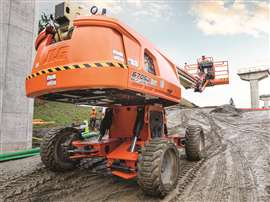 JLG’s 670SJ telescopic, self-levelling boom lift. (Photo: JLG)
JLG’s 670SJ telescopic, self-levelling boom lift. (Photo: JLG)
Equipped with JLG’s patented self-levelling technology, the 670SJ, first seen in 2020, is engineered to automatically adapt to terrain on slopes up to 10 degrees in any direction, while driving with full functionality at 67ft platform height. On the underside of the machine there are four independent axles, controlled smart hydraulic cylinders.
In addition, it offers a 73-foot working height and 57 feet of horizontal reach, with 550 pounds unrestricted and 750 pounds restricted capacity in the basket.
“Improvement in user operability and job site connectivity are major focal points as new technologies become available,” says Rogerio dos Santos, JLG’s VP of Strategy and Portfolio. “These solutions will truly transform how people work at height by increasing productivity and enhancing safety best practices.”
On that note, Genie has this year presented an update of its extreme offroad TraX system redesigned to simplify maintenance while delivering the same performance as the previous version.
TraX is available as a factory-installed option on four boom lifts — two with standard lifting capacity (Z-62/40 and S-80 J) and two with Xtra Capacity lifting capacity (S-45 XC, and S-65 XC.)
The system is the only tracks offering in the industry that can be fitted to high-capacity machines, according to Genie. By allowing the XC machines to maintain their dual capacity, the new Genie TraX increases the flexibility of the lifts, because it can be used on jobsites that require both additional lifting capacity and work on sensitive surfaces.
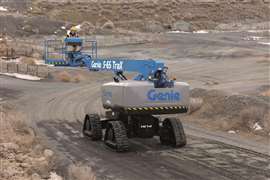 Genie has updated its extreme offroad TraX system, seen here. (Photo: Genie)
Genie has updated its extreme offroad TraX system, seen here. (Photo: Genie)
According to Genie, the system offers an average of 72 percent less contact pressure compared with standard tire options. This is due to their broader weight distribution, which may provide more options to operate TraX boom lifts on sensitive, low-weight floors or in muddy terrain without placing mats or cribbing to support the machine’s weight.
Four independent tracks ensure smooth break-over on rough terrain. Oscillating axles and the ability to swivel up and down by 22° enable the tracks to grip and climb over obstacles in the most extreme working conditions. The redesigned TraX system comes in two sizes: a small frame (for S-45 XC machines) and a large frame (for S-65 XC, Z-62/40, and S-80 J lifts.)
With 50 percent fewer serviceable parts than other tracks systems on the market, inspections are streamlined. Aside from the rubber track and the frame, all parts are common between the small and large TraX systems, reducing parts inventory requirements for rental companies.
In addition, tracks can be swapped for tires, providing greater flexibility in terms of resale options. Additionally, Genie will offer aftermarket upgrade kits to convert 2024 and newer S-65 XC and Z-62/40 boom lift models from wheels to TraX. These kits will launch at a future date.
“Customers in telecommunications, oil and gas industries, quarries, tree care, and construction have been using TraX-equipped boom lifts for more than 15 years in all seasons and terrains — from rocky slopes to sand and gravel pits, in snow and ice,” said Sean Larin, global product director, booms. “Redesigned TraX-equipped boom lifts have been rigorously tested in these environments and exceeded Genie’s high standard for durability and reliability.”
Further product updates
Recognizing the importance of booms for the rental industry, Skyjack recently updated their telescopic boom range line with machine features that combine durability, quality, reliability and serviceability. The SJ45 T+ and SJ66 T+ telescopic boom lifts now feature new restricted capacities, which changed from a single 500lb capacity up to a dual 660/1,000lb capacity.
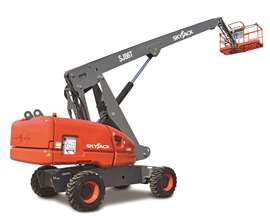 Skyjack recently updated their telescopic boom range line with machine features that combine durability, quality, reliability and serviceability. (Photo: Skyjack)
Skyjack recently updated their telescopic boom range line with machine features that combine durability, quality, reliability and serviceability. (Photo: Skyjack)
Power-train updates to the SJ45 T+ also allowed it to be powered by a 25-horsepower engine.
“In conjunction with its ECOstart anti-idling option, this change will reduce fuel usage up to 40 percent,” says Corey Connolly, product manager at Skyjack.
The main driver was the desire to improve customer ROI, in part related to data from Skyjack’s telematics Elevate solution. Connolly says, “Telematics data highlighted that on typical jobsites, available engine power was rarely being fully utilized thus carrying an unnecessary cost burden with a larger engine.”
The upgrades allow for the use of lower horsepower engines on the 40-foot models while still delivering the same on-site job performance as higher powered units - providing excellent performance with less engine horsepower.
|




